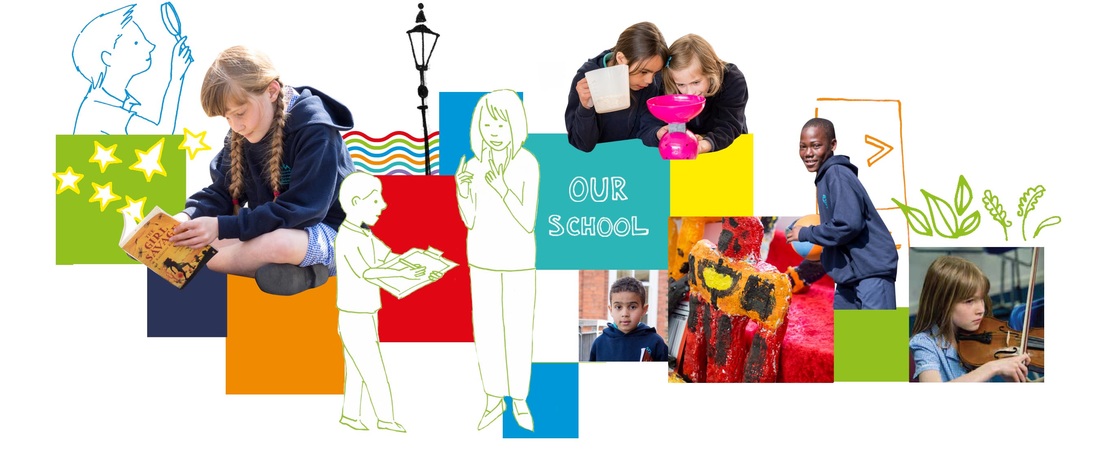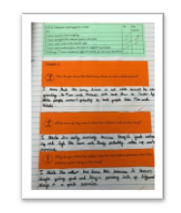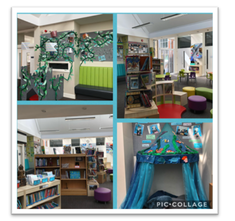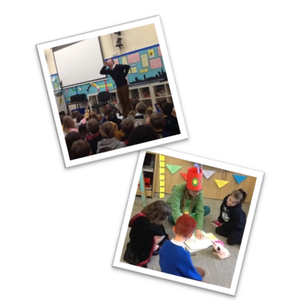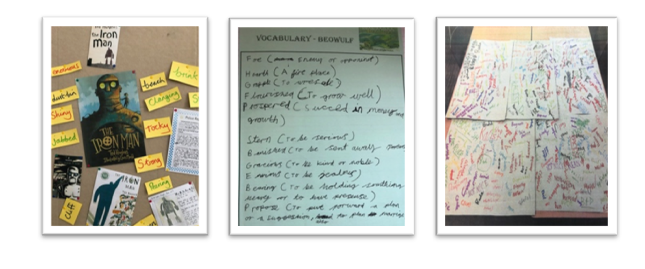Our Curriculum | English | Mathematics |
Science | PSHE | Music | PE | Art | RE | MFL | D&T | Geography | History | Computing | Extra-Curricular |
Science | PSHE | Music | PE | Art | RE | MFL | D&T | Geography | History | Computing | Extra-Curricular |
ENGLISH
At Dulwich Hamlet, we plan our Literacy curriculum around rich, aspirational texts that provide a stimulating starting point for our children. Within each year group, we aim to teach a broad range of books, for example classic texts that will expose the children to archaic language, picture books which promote thoughtful inference and non-fiction. We also incorporate digital media into our planning and this year, we are developing more regular opportunities for creative writing within our Literacy units. Where possible we link our core texts to our Humanities topics but we only promote this link if it is meaningful and not at the cost of high-quality literature.
Writing
Writing opportunities are plentiful at Dulwich Hamlet! We integrate grammar teaching into our writing to produce descriptive short writes which then lead into a longer write where our Hamleteers get a chance to show off their new skills.
We write for a range of real-life purposes such as writing a campaign speech for the rights of female polar explorers, a fairy tale story for a named Year 2 child from our friends at Dulwich Infants, a guide to creating a Neolithic axe and so much more. We believe that writing with a purpose drives motivation and our audience and purpose is at the forefront of our writers’ minds.
In addition to writing based around a rich text, we have three creative writing weeks a year. In these weeks, children focus on developing their knowledge of story telling one aspect at a time. For example, the first week might focus on story openers in a fantasy genre or story endings in a mystery genre. These weeks are genuinely a highlight for our Hamleteers as they are able to let their imaginations run freely – and the stories are a delight to read!
We have created knowledge organisers for children to use in class to recall key grammatical knowledge for their key stage (lower key stage 2 and upper key stage 2). The knowledge organisers are designed in a way that can aid children’s independent revision of grammatical terms and children are encouraged to self-test to revise prior learning.
Year 3 and 4 SPaG knowledge organiser
Year 5 and 6 SPaG knowledge organiser
Spelling and Handwriting
Handwriting sessions are taught at least twice weekly at Dulwich Hamlet, with some pupils receiving more specialist support. When children join Year 3, they are given handwriting sessions daily with handwriting booklets to use at home. We hold high expectations of handwriting across the curriculum from all children. Children are given opportunities to publish their writing with a focus on handwriting which is then displayed across the school and celebrated.
We have adopted a linguistic phonics approach to spelling at Dulwich Hamlet. Our teachers and teaching assistants are being trained in the sounds-write method that describes spelling as deciphering the code of our language. Drawing on their knowledge of phonics from KS1, children look at multiple spellings of the same sound and draw rules to help them know which one to use at the right time. For example, the /a/ sound in play and rain – if you hear /a/ at the end of the word, it’s likely to be spelt ‘ay’ whereas in the middle is it more likely to be spelt ‘ai’. Sounds are progressive throughout the school and children are encouraged to break words down into their syllables then to spell each syllable if they don’t know how to spell it.
Year 3 and 4 SPaG knowledge organiser
Year 5 and 6 SPaG knowledge organiser
Spelling and Handwriting
Handwriting sessions are taught at least twice weekly at Dulwich Hamlet, with some pupils receiving more specialist support. When children join Year 3, they are given handwriting sessions daily with handwriting booklets to use at home. We hold high expectations of handwriting across the curriculum from all children. Children are given opportunities to publish their writing with a focus on handwriting which is then displayed across the school and celebrated.
We have adopted a linguistic phonics approach to spelling at Dulwich Hamlet. Our teachers and teaching assistants are being trained in the sounds-write method that describes spelling as deciphering the code of our language. Drawing on their knowledge of phonics from KS1, children look at multiple spellings of the same sound and draw rules to help them know which one to use at the right time. For example, the /a/ sound in play and rain – if you hear /a/ at the end of the word, it’s likely to be spelt ‘ay’ whereas in the middle is it more likely to be spelt ‘ai’. Sounds are progressive throughout the school and children are encouraged to break words down into their syllables then to spell each syllable if they don’t know how to spell it.
|
Reading
At Dulwich Hamlet we pride ourselves on being a school that reads. In English lessons, the children are taught the specific skills that they need to be able to comprehend increasingly complex texts. We call these lessons RICE – an acronym for the skills of: Retrieval; Inference; Choices that the author makes to impact the reader; Explain the meaning of particular words and phrases. These lessons are carefully planned to ensure that our questioning demands a thorough and sustained analysis of specific passages. You can see examples of the question stems below. There are regular opportunities to write extended and detailed responses to texts, an invaluable aid to the writing skills of the children, as well as reading. KS2 Reading question stems |
|
The love of reading is integral to daily life at Dulwich Hamlet. The children all visit our fantastic library with their class, where their teacher will guide them to ensure they are choosing books that both interest them and carefully push them out of their comfort zone, extending their reading stamina and exploring a range of genres. In Year 3, we have a dedicated reading support assistant, who keeps a close eye on all the children, helping them work through the Dulwich Hamlet book bands in our newly-created ‘Year 3’ library. The main library is open every lunchtime for the whole school, allowing children to borrow a second book of their choosing. The library is staffed by one of our Assistant Heads, ensuring that children borrow books appropriate for their age.
Every class has a class reader and adults in the school can often be heard discussing their own reading habits and choices with the children. Reading aloud to children is essential and allows the whole class to have access to enjoyable and ambitious texts. Below is a recommended reading list for Year 3&4 and Year 5&6 for any parents looking for inspiration for their child’s next read. Year 3 and 4 recommended reading list Year 5 and 6 recommended reading list |
Vocabulary
As a school, we have grounded our approach in the research into vocabulary teaching. We recognise that vocabulary acquisition is tightly linked to reading comprehension and in turn, both reading and writing progress. This year we are continuing to embed strategies to extend pupils’ vocabulary breadth and depth of understanding across all subjects.
As a school, we have grounded our approach in the research into vocabulary teaching. We recognise that vocabulary acquisition is tightly linked to reading comprehension and in turn, both reading and writing progress. This year we are continuing to embed strategies to extend pupils’ vocabulary breadth and depth of understanding across all subjects.
As a school, we are committed to continually developing our teaching so as to maximize progress for all children, whatever their starting point when they join the Hamlet.

